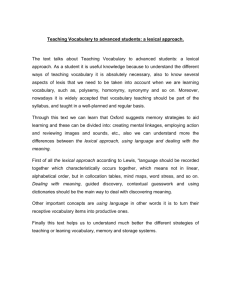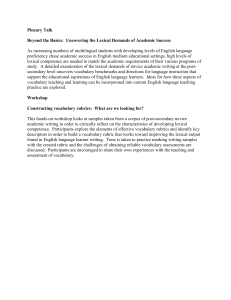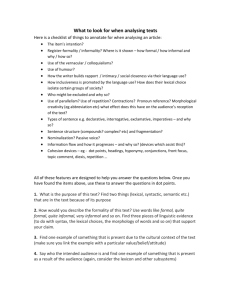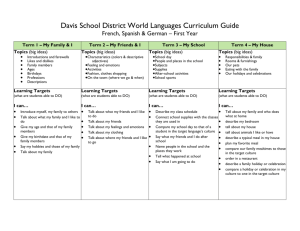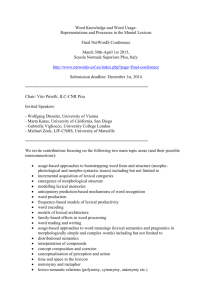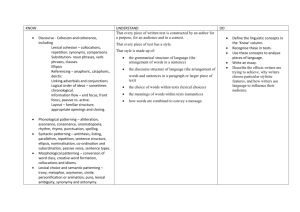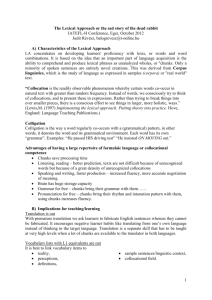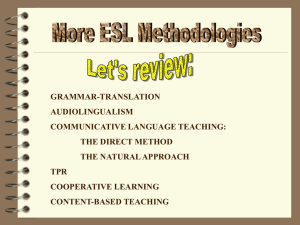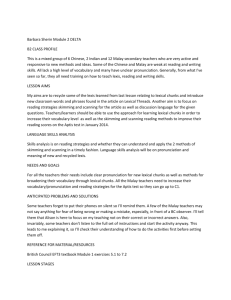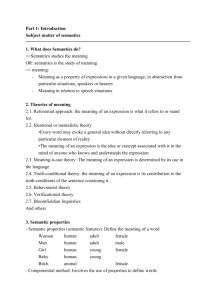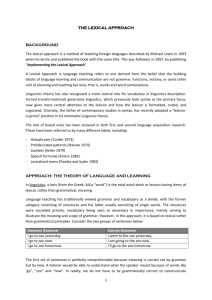The Lexical Approach 2
advertisement
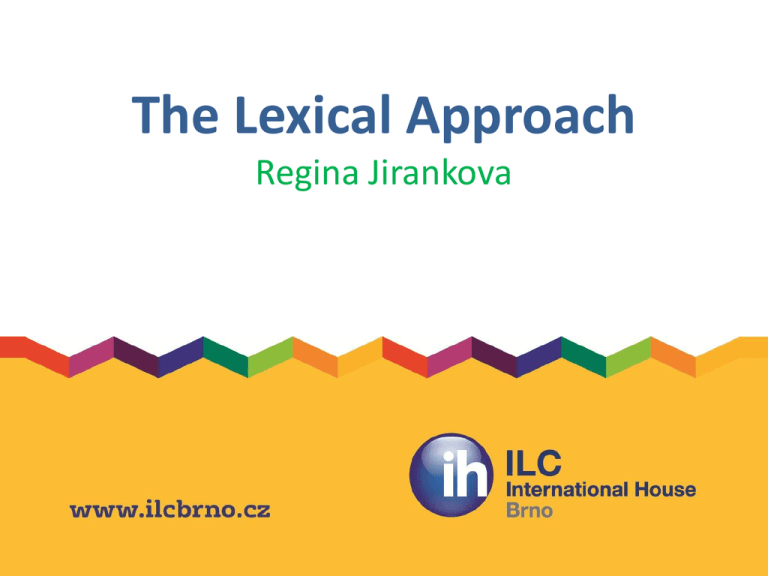
The Lexical Approach Regina Jirankova Regina Jirankova One small step for the teacher, one giant leap for the learner This is only a (very) brief introduction to lexical approach. My intention is not to give an overview of lexical approach, which would be impossible within such a short time limit but to create your interest and to make you think about a slightly different approach to teaching a language. The principles of the Lexical Approach have been around since Michael Lewis published 'The Lexical Approach' 19 years ago. It seems, however, that many teachers and researchers do not have a clear idea of what the Lexical Approach actually looks like in practice. Do you? What? Why? Where? When? How? What is lexical approach? Some of the key principles: • A central element of language teaching is raising students‘ awareness of, and developing their ability to “chunk“ language successfully. • Grammar as a structure is subordinate to lexis. • Task and process, rather than exercise and product are emphasised. • PPP is replaced by OHE. • Reformulation is a way of responding to error. Do you agree? Native speakers have a vast stock of lexical chunks which are vital for fluent production. Fluency depends mainly on having rapid access to these chunks. Teachers should spend more time helping learners develop and activate their stock of phrases. Let‘s look at the introduction: The principles of the Lexical Approach have been around since Michael Lewis published 'The Lexical Approach' 19 years ago. It seems, however, that many teachers and researchers do not have a clear idea of what the Lexical Approach actually looks like in practice. Chunks and collocations All the highlighted parts are fixed or set phrases, chunks of language which are commonly found together and add to conveying the message successfully. Cohesion/coherence What is the appropriate answer? How are you? - ___________ Can you come tomorrow? – No, ________ Would you like a cup of tea? – Yes, ______ /No. _________ Do you mind if I open the window? – No, ___________ When? Lexical approach seems to be favoured with pre-school and primary school children (he is jumping, the car is red) or beginners (Where are you from?, What‘s your name?) but we tend to slide to grammar syllabus as students move to higher levels. Some principles of lexical approach • Focus on receptive skills, especially on listening • OHE – observe, hypothesize, experiment • Noticing, awareness raising, practice • Redirecting students‘ attention to the chunks of language • Many grammar mistakes are caused by lexical deficiency • Grammar is taught as a receptive skill • Reformulation should be the natural response to student error (=responding to contents rather than language) BUT: Don‘t throw the baby out with the bath water Practical tips: Beginners/Elementary: • Greetings • Would you like….? • Do you mind if I…….? • It‘s your turn! Intermediate What are they doing? He is cooking dinner. She is watching him. Use might/can‘t/must The man _______________________ dinner. The woman ____________ his wife. She ___________ He __________ Any level: Advanced A healthy diet is one that helps maintain or improve general health. It is important for lowering many chronic health risks, such as obesity, heart disease,diabetes, hypertension and cancer.[1] A healthy diet involves consuming appropriate amounts of all essential nutrients and an adequate amount of water. Nutrients can be obtained from many different foods, so there are numerous diets that may be considered healthy. A healthy diet needs to have a balance of macronutrients (fats, proteins, and carbohydrates), calories to support energy needs, and micronutrients to meet the needs for human nutrition without inducing toxicity or excessive weight gain from consuming excessive amounts. Demi Moore is reportedly being treated for anorexia. The 49-year-old actress - who filed for divorce from Ashton Kutcher, her husband of six years, in November, after he was accused of cheating on her was rushed to hospital on Monday night (23.01.12) and is said to be seeking professional help for the eating disorder after her weight plummeted in recent weeks. An insider told RadarOnline.com: "She collapsed after having an epileptic seizure. Demi is in getting treated for anorexia, as well as other issues that caused her seizure. "She has not taken care of her health at all lately and has lost a lot of weight." Distancing: • (would) seem, appear, • the passive (it is said, has been announced…) • apparently, according to • may,might Vocabulary cards Reformulation • is an error correction technique. In reformulation, the teacher repeats what the learner has said but correctly, without drawing attention explicitly to the error itself. This technique offers a correct example of relevant language to a learner, at a time when the learner may be ready to notice the difference between what they say, and the correct version. • Example The learner says 'I have been to the swimming pool last week'. The teacher replies 'You went to the swimming pool last week? So did I'. … and the last two collocations for today:
